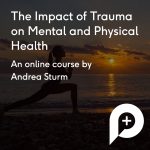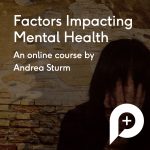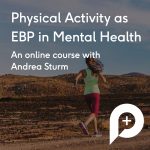This is the last part of the 4 course mental health programme to be released.
An increasing body of evidence indicates that mental health issues are responsible for a large proportion of the burden of disability experienced by people across the world. As healthcare practitioners involved in ongoing close personal interaction with clients, physiotherapists need to be aware of the impact of mental health on the conditions experienced and on how their management can positively influence this aspect of their patient’s well being.
In this exclusive mental health programme of courses we will explore a range of relevant topics and explore how physical therapists can tackle this important and complex issue.
What Affects Mental Health?
 Traumatic experiences are unfortunately a fact of human life and can affect the body, mind, psyche and an individual’s physical and emotional self-regulation. After a traumatic experience, some individuals experience physical symptoms and first-line practitioners should be aware of this when seeing clients after a trauma. The physical symptoms could range from sleeping problems and substance use disorders to disorders of different body systems. There is also a connection between trauma and chronic health conditions. For these reasons, practitioners should be aware of trauma-informed health care and understand the common responses and stress reactions to trauma.
Traumatic experiences are unfortunately a fact of human life and can affect the body, mind, psyche and an individual’s physical and emotional self-regulation. After a traumatic experience, some individuals experience physical symptoms and first-line practitioners should be aware of this when seeing clients after a trauma. The physical symptoms could range from sleeping problems and substance use disorders to disorders of different body systems. There is also a connection between trauma and chronic health conditions. For these reasons, practitioners should be aware of trauma-informed health care and understand the common responses and stress reactions to trauma.
Learn What Affects Mental Health
Other Courses in The Programme
There are three other courses which are part of the programme and they are listed below. Make sure you do them all to maximise the learning opportunity!
All of the courses have been created by Andrea Sturn, a neurological physiotherapist from Austria with a special interest in ethics and mental health.
Factors Impacting Mental Health
 It is crucial for healthcare workers to understand the effects of lifestyle factors and the adverse or positive experiences on individuals who face mild to severe mental health issues. Traumatic experiences, even if they took place in childhood, can continue to contribute to stress in adult life, with poor lifestyle options taken as a survival strategy or coping mechanism. These individuals can be at high risk for chronic diseases like diabetes and cardiovascular disease due to the side effects of medication, alcohol and smoking combined with a sedentary lifestyle. Exercise and diet are considered core elements of lifestyle modification and are essential to physical health. Another important factor is poor sleep quality as it can be a consequence of, or contributing factor to mental illness and can influence other lifestyle factors.
It is crucial for healthcare workers to understand the effects of lifestyle factors and the adverse or positive experiences on individuals who face mild to severe mental health issues. Traumatic experiences, even if they took place in childhood, can continue to contribute to stress in adult life, with poor lifestyle options taken as a survival strategy or coping mechanism. These individuals can be at high risk for chronic diseases like diabetes and cardiovascular disease due to the side effects of medication, alcohol and smoking combined with a sedentary lifestyle. Exercise and diet are considered core elements of lifestyle modification and are essential to physical health. Another important factor is poor sleep quality as it can be a consequence of, or contributing factor to mental illness and can influence other lifestyle factors.
Find Out The Key Factors Which Affect Mental Health
Foundations of Mental Health
 Mental Health is every physiotherapist’s / physical therapist’s business. As a key component of the bio-psycho-socio model used to understand a patient’s individual circumstances, Mental Health concerns in physical therapy are not just confined to those patients who have psychiatric diagnoses. As a healthcare professional with a long term personal relationship with their client, a physiotherapist is in a unique position to be able to identify and address this aspect of their patients well being. This is leading to the growing use of physiotherapy approaches in the treatment of patients even with severe mental health problems worldwide.
Mental Health is every physiotherapist’s / physical therapist’s business. As a key component of the bio-psycho-socio model used to understand a patient’s individual circumstances, Mental Health concerns in physical therapy are not just confined to those patients who have psychiatric diagnoses. As a healthcare professional with a long term personal relationship with their client, a physiotherapist is in a unique position to be able to identify and address this aspect of their patients well being. This is leading to the growing use of physiotherapy approaches in the treatment of patients even with severe mental health problems worldwide.
Foundations of Mental Health
Physical Activity as EBP in Mental Health
 Physical activity (PA) and exercise are increasingly being recognised as efficacious components of treatment for various mental health disorders. There is now increasing evidence supporting the inclusion of PA programs as an adjunct to treatment for various conditions for depression, schizophrenia, anxiety disorders, post-traumatic stress disorder and substance abuse. These research results support the inclusion of clinical PA programs within mental health treatment, facilitated by dedicated clinicians (exercise physiologists/physiotherapists) and there are now many examples of successful integration of clinical PA programs within mental health treatment facilities.
Physical activity (PA) and exercise are increasingly being recognised as efficacious components of treatment for various mental health disorders. There is now increasing evidence supporting the inclusion of PA programs as an adjunct to treatment for various conditions for depression, schizophrenia, anxiety disorders, post-traumatic stress disorder and substance abuse. These research results support the inclusion of clinical PA programs within mental health treatment, facilitated by dedicated clinicians (exercise physiologists/physiotherapists) and there are now many examples of successful integration of clinical PA programs within mental health treatment facilities.
Exercise as Medicine in Mental Health



